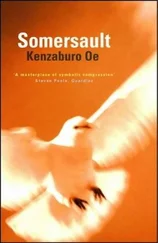“Since my mother wrote this line, we have to look at the meanings she was ascribing to this particular ‘Kogii,’” I said. “The things I’m going to tell you have already been addressed in my books, but when my mother wrote these lines during the last year of her life, she was also using ‘Kogii’ to mean her grandson, Akari, who was born with an abnormal growth on his head.
“My mother was concerned because she felt that I hadn’t made sufficient preparations for dealing with the prospect of Akari’s eventual death. Naturally, her approaching death was very much on her mind as well. And, of course, she had to be aware that the death of her own son (that is, me), who had been called ‘Kogii’ as a child, couldn’t be too far off, either. So I think she mentioned Kogii in this poem as an oblique way of voicing her fear that I might not be preparing properly for my own inevitable demise — an event euphemistically known around these parts as ‘going up into the forest.’ In essence, my mother was conflating two ideas and using them to level a double-barreled criticism at me. She was saying that Akari needs a guide to show him the proper way to go up into the forest, and the responsibility for that should be mine and mine alone. However, she clearly implies that I can’t even seem to get my own affairs in order, and (in her opinion) I’m dillydallying around in a state of obliviousness, with my end-of-life preparations in limbo. This may seem like a lot to read into a short line but trust me, it’s all there.
“The second and last line of my mother’s portion of the poem is And like the river current, you won’t return. Inspired by my mother’s haiku — and electrified by the feeling that her words were right on the mark — I wrote my own lines: In Tokyo during the dry season / I’m remembering everything backward, / From old age to earliest childhood.
“Before we move on, there’s just one more thing. I’d like to talk about the nickname ‘Kogii’ (although I think you may know about this already, through my novels), which has special significance for me.
“First, obviously, Kogii is derived from my real name: Kogito. When I was a child, my family used to call me ‘Kogii’ for short. Although no one else could see him, I had a constant companion who was an exact replica of me: same age, same face, same body. We were as alike as two peas in a pod, as the saying goes. I called this doppelgänger by my nickname, Kogii, and we lived together in perfect harmony — right up until the midsummer day when he took off and wafted up into the forest, leaving me behind. I complained bitterly to my mother, but she just ignored me. Undaunted, I regaled her again and again with every detail of exactly how Kogii made his exit from our house and how abandoned I felt. Asa, among others, has speculated that Kogii’s distressing departure (and my endless retelling of it) might have been an underlying cause for my choice of fiction writing as a career.
“Anyway, on that fateful day Kogii was standing on the veranda outside the back parlor, which looked out toward the river. He was wearing an unlined summer kimono of splash-patterned kasuri cloth. The long sleeves were draped over the balustrade, and he was staring at the grove of Japanese chestnut trees on the opposite shore. (I still have a vivid memory of that moment, in the form of an imaginary photograph; I’m standing right next to Kogii but I look a bit out of focus, as if someone had moved the camera.)
“And then he climbed up on the railing. I thought he was being playful, because he often used to invent little games. He spread both arms and stood very still, taking a moment to center himself and get his balance. Then he stepped out into space — first with one leg, then the other — and a moment later he flapped his arms and simply wafted away through the air. He cut across Mother’s cornfield, passed the stone wall, and floated to a place right above the middle of the river. Then, once again, he spread his arms in their wide kimono sleeves straight out to both sides, and like some great wingless bird he took off on the wind and vanished from my sight. (At that point I was still standing indoors, with the low-hanging eaves partially obstructing my view.) When I stepped onto the veranda and peered up at the sky, I saw Kogii rising ever higher into the forest, twirling upward through the air with a corkscrew motion.
“And just like that, he was gone. From then on I whined incessantly to my mother, telling her how my perfect playmate had abruptly vanished from my life, but she refused to even talk about the other Kogii, as if (it seemed to me) she was unwilling to acknowledge that there had ever been another boy living in her house — a boy who really was as similar to her own son as (I’ll say it again) two peas in a pod.
“So life went on, and one day something extraordinary befell me. Several months had passed since Kogii’s ascent into the heights of the forest; I remember that the slope on the far side of the river was already crimson with fall foliage. It was a full-moon night, and I seemed to sense something unusual happening beyond the windows. I went out onto the road in front of our house to investigate and there, with his back to me, stood Kogii. Without saying a word, he began to walk away — keeping his feet on the ground this time. He took the narrow, hilly road that wound between the village office and the Shinto shrine, striding along the moonlit path at a rapid pace. I thought I was only a few steps behind him, but the next thing I knew I had ended up deep in the forest, alone. Kogii was nowhere to be seen. For reasons I can’t explain, I climbed into the hollow of a giant horse chestnut tree, crouched inside, and spent the night huddled there, either asleep or unconscious. When dawn finally broke, I peeked out into the forest and saw the rain pouring down, drenching the dark red leaves of the trees.
“I must have lost consciousness again. When I regained my senses I was running a fever so high that my entire body seemed to be on fire, and some village firemen were in the act of scooping me out of my hideout in the dry, decaying bowels of the ancient tree. The rescue team wrapped me in a waterproof cloak and carried me away through the rain-scented forest, back to my home in the valley.
“Those heroic firemen deserved all kinds of credit, but as the days went by and my fever abated, I gradually came to realize that my life had been saved by my mother’s intuition. I’m not sure when she realized I was missing, but even in the first hours of frantic worry she had crossed over to join me in the realm of imagination, and had figured out that I must have gone into the forest in search of my dearly missed companion.
“In the wee hours of that full-moon night, after I ran out of the house and didn’t come back, the rain began to fall and the turbid river thundering through the bottom of the valley turned a murky green, darker than the bamboo grass that grew on the riverbanks. The river was rising, and everyone jumped to the conclusion that the missing child must have fallen in and been carried away on the flood tide. Which brings us back to the lines that are carved into the round stone: And like the river current, you won’t return home.
“Now you might think, given the weather conditions and her own experience, that when my mother realized her child was missing and rushed to the fire station, she would have said something like ‘Please start your search for my son by looking downriver.’ That seems logical, doesn’t it? But no — my mother took the opposite tack. She asked the firemen to search for me up in the forest, and even though the torrential rain had flooded the road to the forest, turning it into a muddy river, she insisted that they make their way there, paddling along as if they were in a boat. I’m guessing there must have been a lull in the downpour, and the firemen, who had reluctantly agreed to search the forest, found a small person huddled in the hollow of a giant tree, running a high temperature and clearly very ill. The delirious child tried to fight them off, like some deranged wild boar, but they managed to pick him up and get him safely home. (Incidentally, that particular tree was well known to everyone in the area, and everyone revered it as a sort of naturally created Shinto shrine.)
Читать дальше










